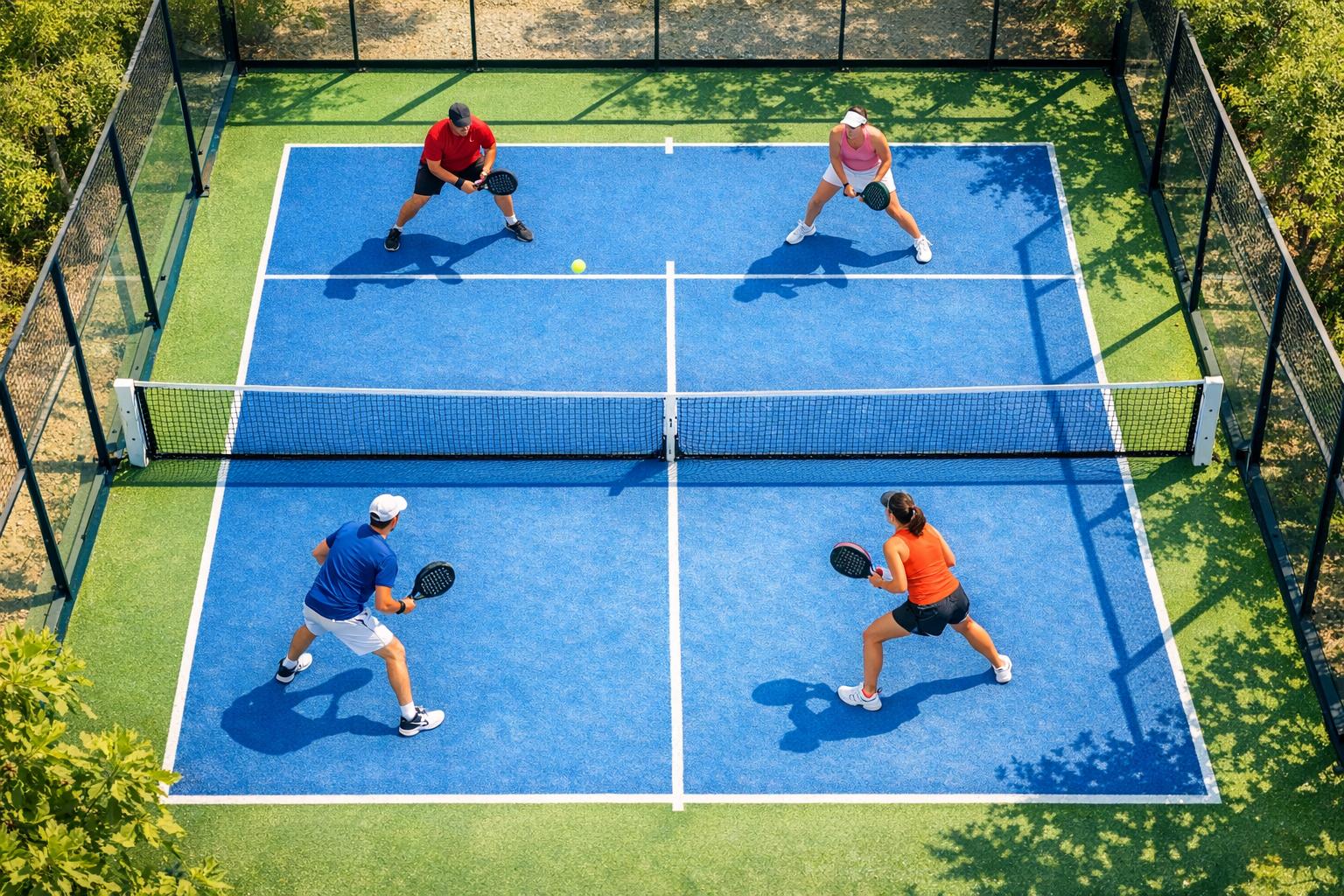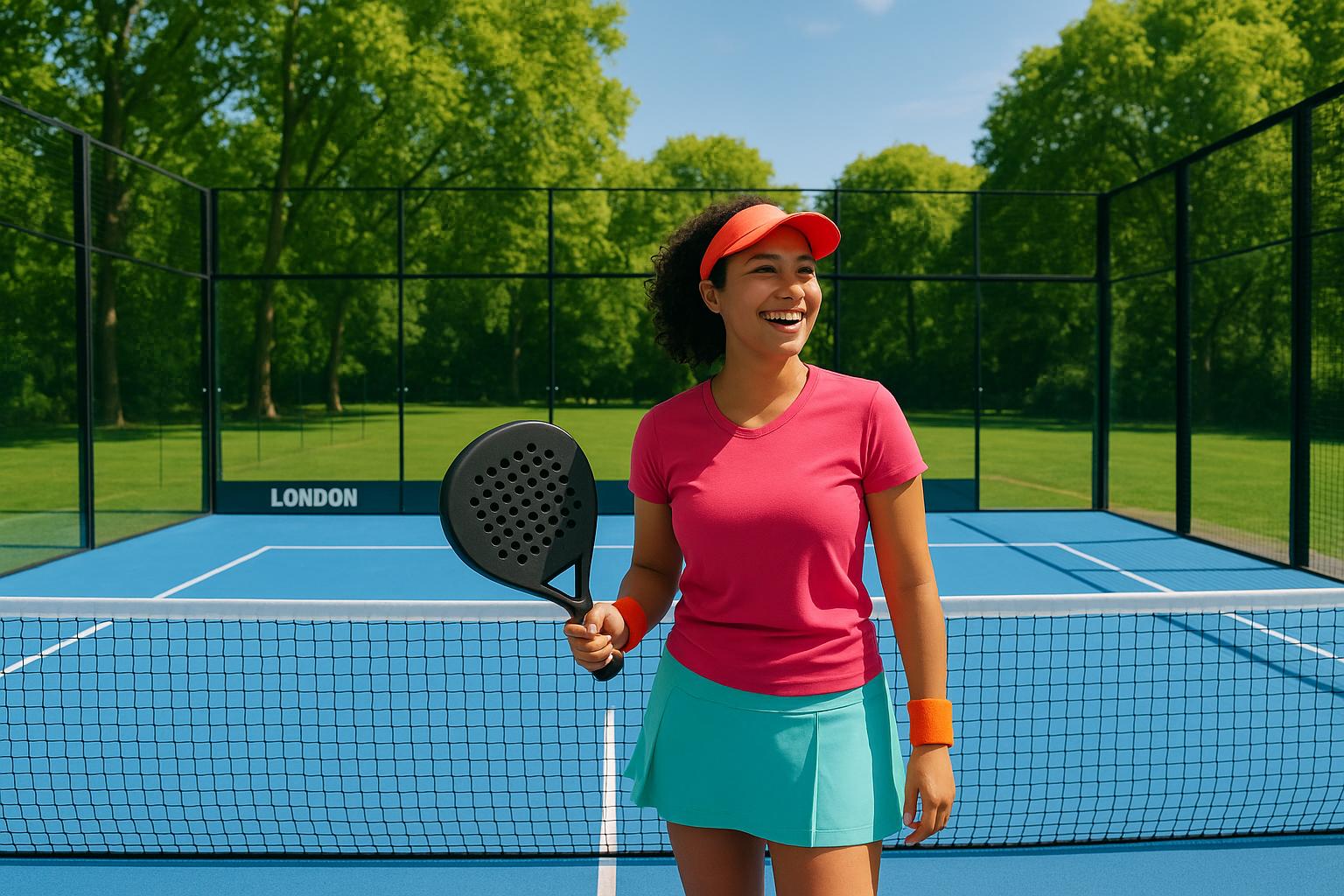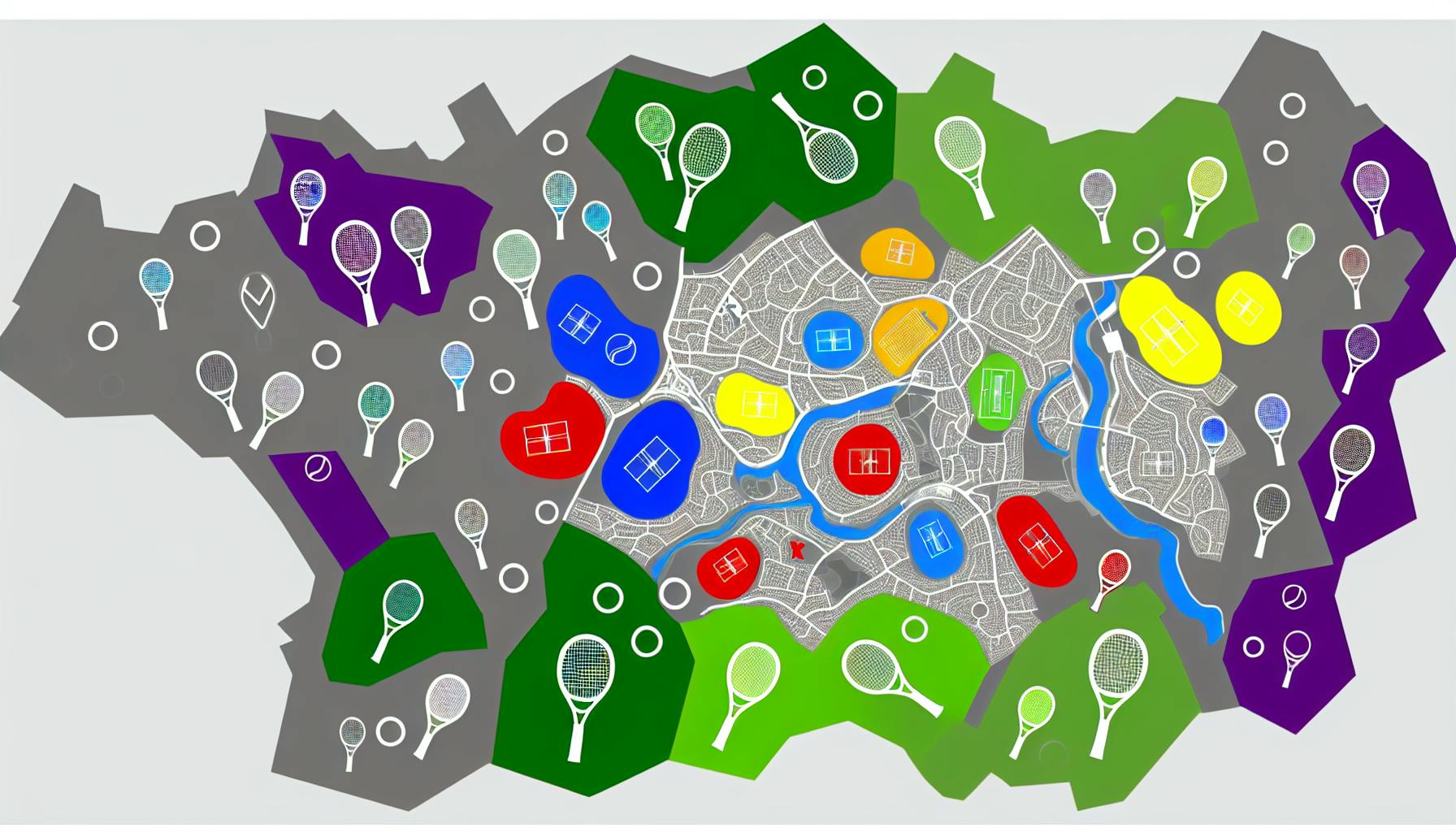Looking to dive into the fast-growing sport of padel tennis in the UK? Whether you're a beginner or a seasoned player, this ultimate guide to padel court hire has got you covered. We'll walk you through everything from finding the perfect padel court near you to understanding costs and making the most of your rental. Here's a quick overview to get you started:
- Padel Court Dimensions: Standard courts measure 20m in length and 10m in width, with varying wall heights.
- Indoor vs. Outdoor Courts: Each has its pros and cons, including cost and weather considerations.
- Finding the Best Courts: Use directories like padelandtennis.co.uk to find courts by location, amenities, and reviews.
- Cost Considerations: Expect to pay £8-£16 per hour for outdoor courts and £10-£20 for indoor courts, with prices varying by location and facilities.
- Quality Factors: Look for well-maintained courts with good facilities and amenities.
- Booking Systems: Technologies like Reservety make reserving a court simple and efficient.
- Maintenance and Upkeep: Regular cleaning, sand redistribution, and checks are essential for court longevity.
Whether you're planning to rent a padel court for an hour or looking into building your own, understanding these key aspects will ensure you have a great experience.
Standard Padel Court Dimensions
A padel court has to be a certain size to be official. Here are the measurements:
- Length - 20 meters (about 66 feet)
- Width - 10 meters (about 33 feet)
- Total area - 200 square meters (around 2,178 square feet)
- Back wall height - 4 meters (around 13 feet)
- Side wall height - 3 meters (around 10 feet)
- Recommended space around the court - At least 0.5 meters (about 1.6 feet)
So, you need about 231 square meters (2,486 square feet) in total for a padel court to fit properly and be safe to play on.
Indoor vs. Outdoor Courts
Playing padel inside or outside has its own set of pros and cons:
Indoor Courts
- Not affected by the weather
- Cost more to build and keep up
- Need lights, temperature control, and regular cleaning
Outdoor Courts
- Cheaper to build
- Affected by weather like sun, rain, and wind
- Need more upkeep
- Not great in very hot or cold weather
Types of Padel Courts
There are a few different kinds of padel courts:
- Glass Wall Courts: These courts have glass panels around them. They're the most common type.
- Solid Wall Courts: The sides and back are made of solid materials you can't see through.
- Porous Pavement Courts: These courts let water drain through the ground.
- Pop-Up Courts: These are temporary courts that can be set up and taken down as needed.
Which one you pick depends on how much money you want to spend, where it's going to be, how often people will play on it, and what kind of playing style you prefer.
Finding The Best Padel Courts for Hire
This part will show you how to find good padel courts to rent using a website called padelandtennis.co.uk. It'll help you pick based on things like where it is, what it offers, what other people say about it, and more.
Using the Court Directory
The website has a list of padel courts in the UK with info on where they are, what they're like, pictures, what you can find there, what people think, and how to book them.
- Look through the list to see all the padel courts you can rent
- Use the map to find courts close to you
- Pick your city or area to only see courts there
- Check out pictures and details like what kind of court it is, if it has lights, what the ground is like, and extras
- Read what other players say
- Click to see when you can play and book it right away
Having all this info in one spot makes it simple to find and decide on a padel court.
Search Tools and Filters
You can use special search options to find courts by where they are, what kind of court, how much it costs, what people say, and what's there.
- Pick a max price to stick to your budget
- Choose the type of ground like artificial grass or concrete
- Look for courts with things like showers, lockers, or a shop
- Find the best-rated or most talked about
- Decide between indoor or outdoor courts
- Set how far you're willing to go to find courts close by
Using these search tools helps you find courts that match what you want, whether it's how much you want to spend, where it is, how good it is, what's there, or other things that matter to you.
The search makes it easy to see all the courts for padel court hire. You can look at everything available or use the search tools to find the perfect court for what you need.
Cost Considerations When Hiring Padel Courts
Let's talk about how much it might cost to rent a padel court in the UK and what affects those prices, like where the court is, if it's inside or outside, and what extras it has.
Typical Padel Court Hire Rates
On average, renting a padel court costs between £8-£16 per hour during the week and £10-£20 per hour on weekends if it's outside.
What changes the hourly price:
- Location - It's pricier in big cities and popular spots.
- Court type - Indoor courts cost more than outdoor ones.
- Facilities - If there are extra things like locker rooms or a place to relax, it'll cost more.
- Peak vs Off-Peak - Evenings and weekends are busier, so they're more expensive than weekdays or mornings.
You might get a discount if you book for several hours or more than one court at a time.
Key Factors Influencing Cost
Here's what mainly changes the price of renting a padel court:
Location
- Bigger cities and hot spots are more expensive.
- Quieter places are cheaper.
Court Type
- Expect to pay 20-40% more for an indoor court.
Facilities/Amenities
- Extras like lockers and showers mean higher costs.
- Simple outdoor courts are the cheapest.
Peak vs Off-Peak Timing
- Busier times like weekends and evenings cost more.
- Mornings and weekdays can be cheaper by about 20-30%.
Multi-Hour or Bulk Booking Discounts
- Booking for longer times or more courts can save you money.
Knowing these things can help you get a good deal. Think about what's most important to you, like convenience or the type of court, when choosing.
What to Look for in a Quality Padel Court
When you're thinking about renting a padel court, there are a few important things to check out to make sure you have a great time playing.
Court Surface Material and Maintenance
The type of surface and how well it's looked after really matter. You want a court that:
- Uses artificial grass or a soft hard court
- Is clean and free from stuff like leaves or trash
- Doesn't have puddles after it rains
- Gets taken care of regularly, like being cleaned and having the sand fixed
A well-maintained court makes the game smoother and keeps you from getting hurt because of a bumpy surface.
Facilities and Amenities
Good padel places have extra stuff that makes playing there better:
- Places to sit and relax
- Changing rooms and showers
- You can rent equipment if you need it
- Shops to buy gear
- Snacks or drinks available
- Easy parking and getting there by bus or train
These extras help you enjoy not just the game but also the time you spend at the venue.
Key Factors by Court Type
| Court Type | Key Factors to Evaluate |
|---|---|
| Outdoor Courts | How open it is, which way the wind blows, how well water drains, lights for night play, cover from bad weather |
| Indoor Courts | How high the ceiling is, air flow, how well you can see, places to watch from |
| Glass Wall Courts | How clear the glass is, if the seals are good, padding for safety |
| Porous Pavement Courts | How solid the base is, how well it drains, any special surface treatment |
Different types of padel courts have their own things to think about. Knowing what to look for helps you pick the best court for your game.
Checking these things about court quality and what the place offers means you can pick the best spot for your needs when you want to rent a padel court.
Booking Systems and Technology for Padel Clubs
Reservety
Reservety is a system that makes it really easy for padel and tennis courts to handle their bookings online. Here's what it does:
- It has a simple calendar online where you can see when courts are free.
- You can change how your booking page looks and how people check out.
- It works with payment services like Stripe and PayPal.
- It keeps track of which courts are free and lets you know.
- It helps manage members.
- It can work with systems that control court lights and doors.
This way, padel clubs can make booking a court easy for everyone, while also keeping everything organized in one spot.
Benefits of Reservety
Using Reservety to book padel courts is good for clubs because:
Avoid Double Bookings
- The calendar updates in real time, so players can see when courts are available.
- This stops two people from booking the same court at the same time.
End-to-End Reservation Management
- You can handle bookings online, over the phone, or in person, all in one system.
- You can see all bookings coming up and those that have happened before.
- Players get automatic confirmations and reminders.
Collect Payments Online
- You can take payments safely with credit cards, PayPal, or bank transfers.
- You can ask for deposits or payments in advance.
- Players can pay an extra fee for booking online.
User-Friendly Booking Experience
- The booking site is easy to use.
- It works well on phones too.
- Players can save their payment info and details.
By using Reservety, clubs can make the whole process of booking a padel court better for players, while also making their own work easier.
sbb-itb-5591e69
Maintenance and Upkeep of Padel Courts
Key Maintenance Tasks
Keeping padel courts in good shape is important for a great game and to make sure they last a long time. Here are some things you should do regularly:
- Weekly sweeping and cleaning: Every week, use a gentle brush and a rubber tool to get rid of leaves, trash, and other things on the court. This helps keep the court safe and clean.
- Sand redistribution every 2-3 weeks: Every few weeks, use a brush that's not too hard to spread the sand evenly across the court. This helps the ball bounce right and stops the court from wearing out too quickly in places where people play a lot.
- Non-oil based fungicide application twice yearly: Twice a year, use a special cleaner that doesn't have oil in it to treat spots that don't get much sun or use. Oil-based cleaners can harm the court.
- 6-month deep cleaning and decompaction: Twice a year, it's a good idea to have a professional take out the sand, clean it, and put it back. This refreshes the court and helps rainwater drain better.
Additional Upkeep Considerations
-
Once a year, check the edges, walls, nets, and glass for any damage. Fix anything that's broken.
-
Clean the glass walls now and then to keep things clear and make sure the ball bounces the same way every time.
-
Every year, check the screws and anchors that hold the walls and glass in place. Replace any that look worn out or damaged. Sand down and prime any spots that you fix.
Additional Considerations
Building and Installing New Padel Courts
When you're thinking about setting up new padel courts, there's a lot to consider. Here's a quick rundown:
- Planning Permits: Before you start, make sure to get the right permissions from your local government. This makes sure your project follows all the rules.
- Space Requirements: You'll need at least 20m x 10m for a standard padel court. Don't forget to leave some extra space around it for moving around. If you're planning a place with several courts, think about where people will sit, and where to put locker rooms or other features.
- Drainage: Good drainage is key, especially for outdoor courts, to stop water from pooling. For indoor courts, make sure there's enough air flow to keep things dry.
- Budget: Building a padel court outdoors can cost between £55,000-80,000. This includes everything from materials and labor to installing the glass walls, net, and lights.
Promoting Your Padel Courts
- Social Media: Use platforms like Facebook and Instagram. Share pictures and videos of your courts and the people playing. Remember to use hashtags like #padel and #padeltennis.
- Events: When you first open, consider having an open day. You can also run beginner sessions or team up with coaches for lessons.
- Discounts: Attract people by offering lower prices for booking courts or lessons at first. Think about creating deals for those who come often.
- Partnerships: Work together with nearby tennis clubs, gyms, or schools to help spread the word about padel.
- Press Releases: Let the local media know about your new courts. You could even invite journalists or social media influencers to try padel.
Conclusion
Renting a padel court is a great way to get into this fun sport, no matter if you're just starting or you've been playing for a while. This guide has given you all the info you need to find and book a good padel court without any hassle.
Here's what to remember:
- Costs are usually between £8-16 per hour for outdoor courts and £10-20 for indoor ones. The price can change based on where the court is, what facilities it has, when you want to play, and if you're booking a lot of hours at once.
- Padelandtennis.co.uk helps you find good courts near you that fit what you're looking for, based on reviews and what they offer.
- When picking a court, make sure it's well-kept, has the facilities you need, and other players have said good things about it.
- Booking systems like Reservety make it super easy to book online and help clubs keep track of their bookings.
- With more people wanting to play padel, anyone thinking of setting up new courts should think about how much space they need, how to deal with water, how much it will cost, and how to let people know about their courts.
By understanding the basics like court size and type, looking for courts that are in good shape, using online booking, and thinking about how much it costs, renting a padel court can be easy, cheap, and fun for everyone.
Related Questions
How much does it cost to book a padel court?
Booking a padel court usually costs between £8-£20 per hour in the UK. The price can change based on where the court is, if it has special features, if you're playing during busy times, and if it's indoors or outdoors. Indoor courts are a bit more expensive. If you book for many hours or more than one court, you might get a discount. The price often includes the court, balls, and racquets.
How much does it cost to get a padel court?
Putting in a standard outdoor padel court can cost from £55,000 to £80,000. This price covers everything needed like materials, making the court, glass walls, lights, getting the right permissions, preparing the land, and the work to build it. Indoor courts cost more because they need extra things like a building. If you're setting up more courts or adding extra stuff, it will cost more.
How much is it to rent a padel racket?
Renting a padel racquet usually costs about £5-10. Places that let you book a court often include racquet rentals in the price or offer it as an extra. It's a good idea to ask if the racquet rental is included or if you need to pay more when you book.
Why is padel so expensive?
Padel equipment like racquets and balls cost more because they need special materials and careful making. They go through a lot of checks and use new tech to make sure they're good to use. The market for padel isn't as big, so making these items costs more per piece. The high prices help cover the costs of making high-quality gear.


